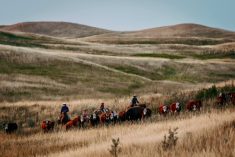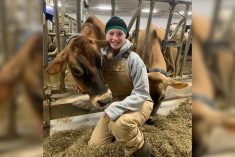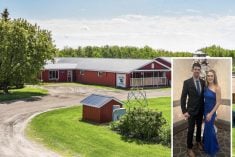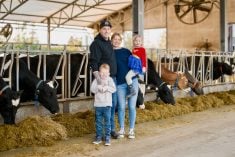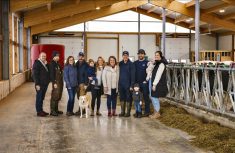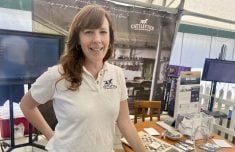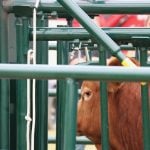Everyone has ideas. Every day. Every hour. And some of those ideas really are solid. Some are even exceptional. Yet only a few of us actually take those ideas and turn them into successful farm businesses. What is it about the people who do that? What’s their magic?
For some light on all this, Country Guide talked to two farms that have taken great ideas through to fruition, and we also talk to agricultural investors and business mentors who are looking to help. Can you really know ahead of time which ideas will succeed?
Sheldon Creek Dairy: Ask the right questions
Read Also
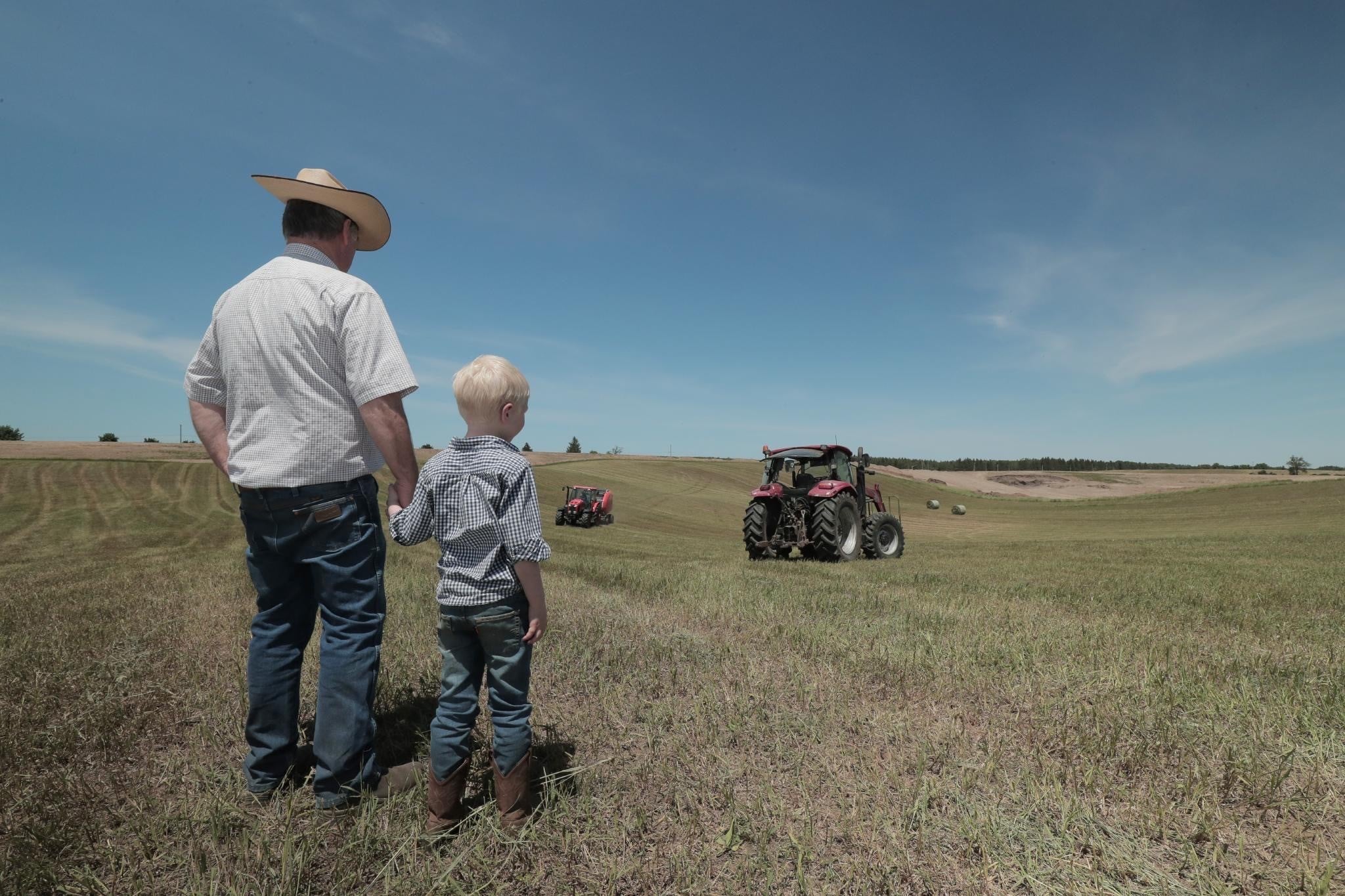
Where convention and innovation meet
How one Ontario farm is integrating technology into their beef operation.
Perseverance and willingness to take a risk are among the personal qualities that John and Bonnie den Haan of Sheldon Creek Dairy embrace, and they know these qualities have helped them successfully broaden their milk sales into a full line of dairy products, available in hundreds of stores across the province.
And they’ve got another key success trait too: the ability to ask the right questions over and over again.
Appropriately, since this is a story about the den Haans, it all starts with the consumer. With their farm just an hour from the northern edge of Toronto, and with their busy farm-gate sweet corn business, the den Haans had noticed they were getting potential customers coming to the farm looking for fresh, raw milk. It seemed a ready-made market, and Bonnie and John started looking into how they could legally meet this demand.
The first step involved identifying and visiting other farms with on-site processing. “We spent a lot of time learning from others,” says John. “And then it was just an adventure of trying to find a team to work with, as far as equipment and building.”
[RELATED] Farms from away!
Listening to others has been crucial to their success. “You have to know what you don’t know and be willing to find out,” Bonnie says. That’s a bigger job than anyone might think, and you have to enjoy doing it to make it successful. “Talk to everyone,” Bonnie says, “especially the contractors coming on your farm — the electrician, the food safety inspector, the robotic repair person, the feed specialist and the crop advisor. Everyone can provide you with knowledge and networks.”
“Have a really good relationship with your lender,” Bonnie adds. “Your partners need to be aware of what’s happening, good or bad.”
The den Haans speak from years of experience. They got used to debt just nine months after their wedding when their barn burned down. Years later, when they wanted to expand into processing, they had both a strong credit rating, and trust with a lender.
Another key to their success is that they address issues immediately. And they utilize those around them to help. “For example, if a quality issue pops up in one of our products that we haven’t seen before, we’re on the phone to our cleaning chemical guy, the food scientists, the biochemist, everyone necessary, to get it fixed immediately,” says Bonnie.
“We’ve realized people who like to solve problems love having problems to solve.”
One of the early questions den Haans had to address was how to deliver pasteurized milk that tasted as close as possible to the raw milk their customers wanted. The answer lay in developing a process where they pasteurize the milk at just 72 degrees Celsius for 16 seconds so the protein membrane of the fat globule remains intact.
Since it is non-homogenized, the cream rises to the top on their whole milk, showing that it is still in its natural form. All their products including A2 milk, flavoured creamers, yogurt and kefir, use this whole milk as their staring point.
The farm operation is very much a family business. John inherited the farm from his parents, although it was a beef operation then. Now both of their daughters are taking over the reins with their young families.
[RELATED] B.C. farmers go vertical with sales and processing
“Having our daughters join us full-time has allowed us to expand. Emily manages the Haanview Farms operation and Marianne handles everything on the Sheldon Creek side, including the building (of) a new facility which will quadruple our size,” Bonnie says. “The girls bring new energy and excitement and see lots of opportunities.”
Onward Ranch: Take a look beyond
Ingrid Johnston and her husband Ty operate Onward Ranch, a 4,500-acre cattle ranch near Williams Lake, B.C. Recently they have started delivering the first ever grass-fed beef boxes in the province.

It all started with a key observation. During a chat with a group of local farmers who all sell beef, the Johnstons noticed something they hadn’t really paid much attention to before. The beef everyone kept for themselves (in their minds, the best meat) was from animals which were solely and slowly raised on pasture.
The Johnstons asked themselves, why shouldn’t the consumer have access to this amazingly tasty meat?
“We knew that the grazing on our ranch was stellar, and that the quality of grass was a major strength for our land,” Ingrid says. “Not everyone can go grass-fed and grass-finished and do it properly.”
In essence, their decision to launch the delivery business was the culmination of 20 years of ranching together, she says. “We had focused so much on sustainable, regenerative and natural practices, and knew this was a direction we wanted to take.”
[RELATED] Like Nowhere Else: John Smith and Laura Laing
They soon learned, though, that it’s one thing to sell direct from the farm or at a farmers market; a delivery service is much harder and the Johnstons (like the den Haans) needed to look beyond Canada to find answers to many of their questions.
“Our whole journey with connecting and shipping directly to families has been very liquid and very open-minded,” says Ingrid. “Because there was no template in B.C., we have had to be flexible and learn as we go. We realized that some packaging materials were simply not available in Canada, for example.”
Then Ingrid got a chance to travel and learn through a Nuffield Canada scholarship in 2022. Her studies focused on how primary producers can direct market their farm products and ship to consumers without using a distribution company, and she credits Nuffield for giving her a global view on this situation.
“Each place I have visited has its own style of connecting rural farmers to urban consumers,” she says.
“I found that looking in diverse places has proved extremely interesting and beneficial. Sometimes it isn’t someone directly in your industry that teaches you the most. For example, learning how a fisherman might ship his tuna, or a coffee plantation connects with their customers directly, all have been thought-provoking for our business. Having an open mind is so crucial to learning.”
Looking back, the Johnstons wish they had started earlier and built a market alongside growing their herd. Instead they focused strictly on agriculture excellence first, including genetics and land management. In the U.S., by contrast, new producers start immediately with direct-to-consumer connections, enabling the farms and the markets to grow and adapt together.

Now, though, it’s on to the next step. The Johnstons recently built an on-farm kitchen and they plan to offer marinades, rubs and spices to complement their beef, all in line with their business philosophy.
The number one thing, Ingrid says, has been approaching “farm to door” as a slow game. “Grow incrementally with loyal customers,” she says. “Our goals are measured in one-year and even five-year increments. Humbleness, flexibility and a willingness to serve and help others have been important traits.”
Financing the dream
On top of perseverance and lots of research, great ideas require money and outside mentorship. Farmers aren’t necessarily good at asking for either, so how to go about looking for investors?
First, arm yourself with the right attitude, says Dave Smardon, president and CEO of Bioenterprise, a Guelph, Ont.-based network of entrepreneurs, accelerators, and service partners with a mandate to drive innovation across Canada in the agri-tech and food industries.
[RELATED] Raising the steaks for a hometown business
Attitude is crucial, Smardon says. “You want somebody that’s very passionate about what they do, but also has a desire and willingness to listen and to take our advice.
“Everybody thinks they just need money from us, but really it’s human resources. We spend a lot of time on finding a good business founder, but then they require people with good technical, financial, marketing, sales and other skills. It’s about human resource development and talent development.”
The view is the same at London, Ont.-based RH Accelerator, which sees its mission as “helping business owners, founders and the teams in early-stage companies achieve their dreams.”
“We are operated by business owners who have succeeded,” the RH Accelerator website says. “We invest in the next generation of companies and only profit when our companies succeed.”
To co-founder Joe Dales, the focus starts with personality, and it can be easy to spot the potential winners.
“A lot of people bring ideas to me and 80 per cent of them don’t do the follow-up work I suggest,” Dales says. “I have to determine if the person has the skills, the passion, the perseverance, the ability to learn and the understanding that at the beginning of any new business, one may be working for a penny an hour.”
Second to attitude for Smardon comes a solid understanding of the potential customer base. If it’s an agricultural idea, he says, “It may work well on your farm, but does it on neighbouring farms?”
And what if it’s an idea that isn’t being pitched at other farmers?
“It has to be an innovative way of doing something for us to invest,” Smardon says. “If someone comes to us with a new yogurt product, we don’t really care, as that market is saturated. If someone comes to us with a new way of manufacturing that yogurt product which reduces the amount of water or energy used, then we are interested.”
Bioenterprise also looks at how long it will take to get from an idea to the marketplace. They are interested in something that can be developed and adopted by the industry within approximately three years. And by industry they mean a big market, outside of just Canada.
So how does a farmer start the conversation with investors like Dales and Smardon? Both say they are always willing to take calls, email and meetings. Smardon adds, “We (Bioenterprise) will talk to everybody and anybody.” Both Bioenterprise and RH Accelerator groups are always networking. They attend farm shows and sponsor events where there are often line-ups of people wanting to talk.
Normally, says Smardon, once the initial connection is made, the budding entrepreneur will get introduced to an innovation advisor. Bioenterprise has advisors across many industries, so if the idea involves the dairy industry, the person will be put into touch with an advisor with dairy knowledge and networks.
In that initial conversation they learn about the uniqueness and viability of the idea and gauge the characteristics of the person. From there, there’s a whole lot of behind the scenes work to evaluate the idea and gather essential information.
Along the way, it’s also essential to get strong on the numbers. Having a solid financial analysis is critical for Dales. “It’s a big piece.”
But that’s what it is … one of the essential pieces. Says Dales: “We want to see a clearly identified analysis of the customer, existing competitors, the available marketplace and the financials.”



